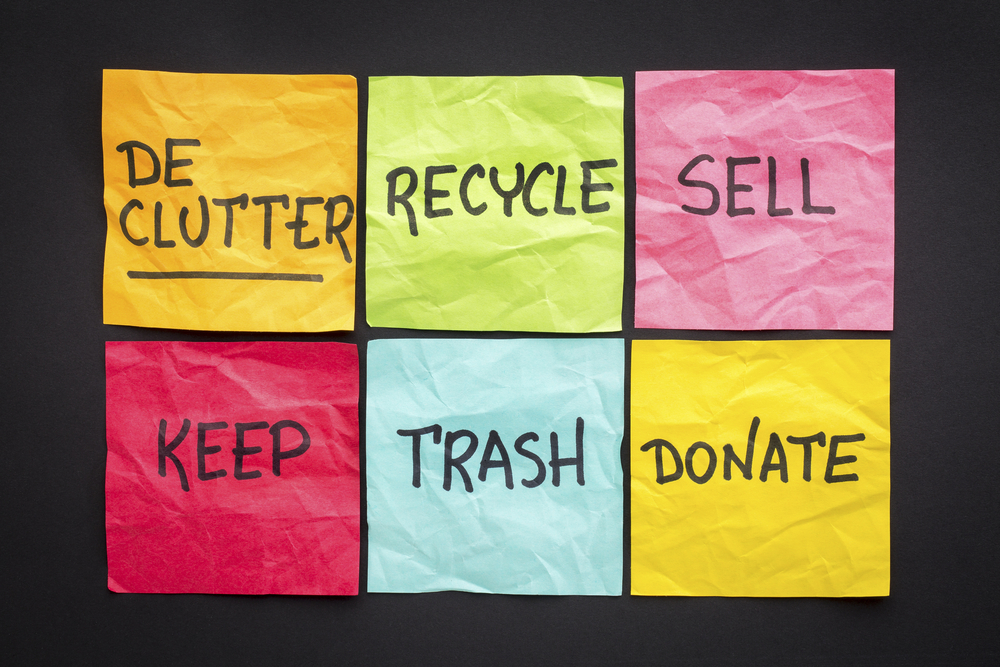Can you cut 1 Tonne of carbon pollution out of your life?
Take the challengeFor the longest time, I thought that decluttering and zero waste were opposites. Didn’t decluttering mean chucking decent stuff away, and zero waste mean throwing nothing away and hoarding it all? I couldn’t imagine that the two could work together, yet decluttering has been an important part of my zero waste journey.
I've come to learn that decluttering and zero waste living are not opposites at all. Decluttering can be just as much about wasting less. If you want to live zero waste, don't write off decluttering. Here are five reasons why decluttering is a valuable part of living with less waste.

Decluttering doesn't mean sending to landfill (or dumping at the charity shop).
When it comes to getting rid of unwanted items, the two most commonly cited options are discard or donate. Discarding really should be a last resort, saved only for those things that are damaged beyond repair, non-recyclable, and possibly dangerous. But what about donating?
Charity shops want goods that are clean, in working order and desirable. They need to be able to sell them! (Charity shops are not places to take soiled, damaged or dubious goods simply because we can't bear the guilt of throwing them away ourselves.) But charity shops aren't the solution for everything, and they don't have limitless storage. Taking our winter wardrobes in the height of summer will likely mean good quality items end up unsold simply because there isn't the demand, and offloading things in the week after Christmas when the rest of the country is doing the same thing probably won't be much help, either. Not all charity shops can accept electrical items. If you really care about waste, you don't need to hope that the charity shop will on-sell your stuff. you can take matters into your own hands. Finding new owners for the things you want to declutter is the best way to ensure they stay out of landfill.
Before donating, call the charity shop and ask if there are things that they need (and also things that they don't). There will always be things in high demand and things that aren't. Don't limit your donating to the charity shops. Women's refuges, charities and animal sanctuaries are other places that accept donations. Schools, clubs, community groups, crafting societies and charities all have needs and might be able to help take unwanted items. Online classified sites like Gumtree are a great way to find new owners for unwanted goods, and a way to offer broken goods for parts and spares.

Decluttering is a way to maximize the use of something.
This sounds counter-intuitive – how is giving something away going to maximize its use? This depends on whether we actually use the things in question. Owning stuff we don't need, don't use and don't like is a complete waste. There are two main reasons we keep things we don't need: just in case (fear of the future), or guilt (regret for the past).
We might need it in the future. That is true. But if we haven't needed it so far, what are the chances? Could we get a replacement quickly, affordably and second-hand? This will depend on individual circumstances, but in most cases, there is no need to keep something just in case. There will be someone out there looking for that item, who will use it today.
We might feel guilty. There are many reasons that we feel guilt: we made a poor choice, spent too much money, didn't lose the weight we' hoped, dislike the handmade gift that we know took so much effort and time. Keeping something out of guilt does not increase the chances that we will use it. Keeping an unwanted item and thinking that we somehow alleviate the guilt won't work. The best way to ease the guilt is to let the item go.
We sometimes try to justify keeping things that that we don't use rather than giving them away by telling ourselves that we are reducing waste. Actually, the opposite is true. Owning something that you never use is the biggest waste of all. It is far better to give these things to people who truly need them and will use them every day.
Decluttering as an end, not a means.
Decluttering is about removing the unnecessary, the unused and the unwanted from our homes. It's about removing the excess, and keeping only the things we find useful and beautiful. If our homes are filled with items we use regularly and appreciate, there is little or no waste. Yet decluttering will only reduce waste if it's treated as a one-way process, rather than a means. If the purpose of decluttering is simply to make room in the house for a big shopping spree where the old stuff is replaced with a bunch of new stuff, clearly that is going to generate a whole heap of waste. Until the cycle of consumption is broken, and needless things are no longer brought into the home, decluttering can never mean less waste.
Decluttering helps conserve resources.
Have you ever tried to buy something second-hand, and not been able to find it? Sometimes we need things, and we want to purchase them second-hand, yet that isn't an option. If we really need that item, we'll probably have to go and buy it new. Yet somewhere, there would have been an unwanted, second-hand option that would have been perfect.
Rather than keeping things to ourselves, we should embrace the opportunity to share what we have. There are so many resources tied up in cupboards, wardrobes, playrooms, shed, garages and attics around the world in the form of unused stuff. Decluttering frees up these resources so others can use them. Donating items we don't need gives somebody else the opportunity to use them, and helps prevent new purchases.

Decluttering helps form new habits.
I have always found decluttering hard. I found it hard because I was forced to confront my poor decisions (impulse purchases, wasted money, non-repairable items), and my failure to achieve what I'd hoped (hobbies that never got off the ground, clothes I never slimmed into). I know I'm not alone in this. We've all made choices that we regret, and we've all purchased things that in hindsight, we wouldn't purchase again. Because I struggled so much with decluttering, I now think much more carefully about what I bring into my home. It forced me to examine my old habits, and think about the decisions I had made in the past. As a result, I now make better choices. Can the item be mended? Can it be recycled? Is it built to last? Do I have a real, genuine need to own it? Is there a second-hand market for it?
I can appreciate well-made clothes, or admire chic decor or clever design, but that doesn't mean that I need to make a purchase. There will always be beautiful things. If I don't need it, or can't see how I will dispose of it responsibly, then I don't buy it.
Written by Lindsay Miles and originally featured on Treading My Own Path.
